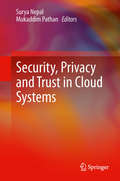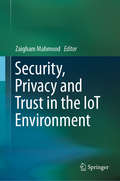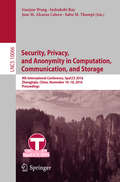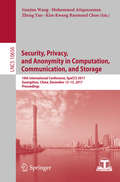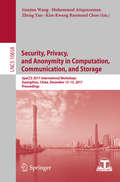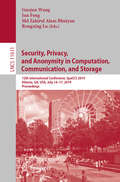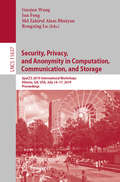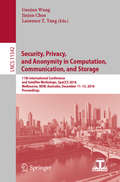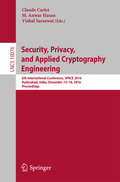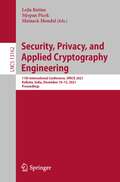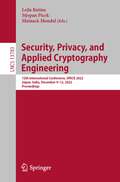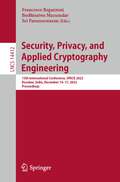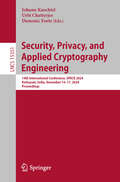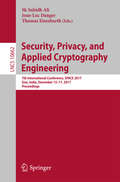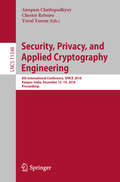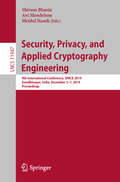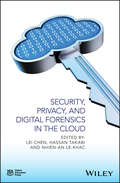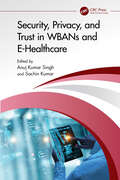- Table View
- List View
Security, Privacy and Trust in Cloud Systems
by Mukaddim Pathan Surya NepalThe book compiles technologies for enhancing and provisioning security, privacy and trust in cloud systems based on Quality of Service requirements. It is a timely contribution to a field that is gaining considerable research interest, momentum, and provides a comprehensive coverage of technologies related to cloud security, privacy and trust. In particular, the book includes - Cloud security fundamentals and related technologies to-date, with a comprehensive coverage of evolution, current landscape, and future roadmap. - A smooth organization with introductory, advanced and specialist content, i.e. from basics of security, privacy and trust in cloud systems, to advanced cartographic techniques, case studies covering both social and technological aspects, and advanced platforms. - Case studies written by professionals and/or industrial researchers. - Inclusion of a section on Cloud security and eGovernance tutorial that can be used for knowledge transfer and teaching purpose. - Identification of open research issues to help practitioners and researchers. The book is a timely topic for readers, including practicing engineers and academics, in the domains related to the engineering, science, and art of building networks and networked applications. Specifically, upon reading this book, audiences will perceive the following benefits: 1. Learn the state-of-the-art in research and development on cloud security, privacy and trust. 2. Obtain a future roadmap by learning open research issues. 3. Gather the background knowledge to tackle key problems, whose solutions will enhance the evolution of next-generation secure cloud systems.
Security, Privacy and Trust in the IoT Environment
by Zaigham MahmoodThe Internet of Things (IoT) is a network of devices and smart things that provides a pervasive environment in which people can interact with both the cyber and physical worlds. As the number and variety of connected objects continue to grow and the devices themselves become smarter, users’ expectations in terms of adaptive and self-governing digital environments are also on the rise. Although, this connectivity and the resultant smarter living is highly attractive to general public and profitable for the industry, there are also inherent concerns. The most challenging of these refer to the privacy and security of data, user trust of the digital systems, and relevant authentication mechanisms. These aspects call for novel network architectures and middleware platforms based on new communication technologies; as well as the adoption of novel context-aware management approaches and more efficient tools and devices.In this context, this book explores central issues of privacy, security and trust with regard to the IoT environments, as well as technical solutions to help address them. The main topics covered include:• Basic concepts, principles and related technologies• Security/privacy of data, and trust issues• Mechanisms for security, privacy, trust and authentication• Success indicators, performance metrics and future directions.This reference text is aimed at supporting a number of potential audiences, including• Network Specialists, Hardware Engineers and Security Experts • Students, Researchers, Academics and Practitioners.
Security, Privacy and User Interaction (Springerbriefs In Computer Science Ser.)
by Markus JakobssonThis book makes the case that traditional security design does not take the end-user into consideration, and therefore, fails. This book goes on to explain, using a series of examples, how to rethink security solutions to take users into consideration. By understanding the limitations and habits of users – including malicious users, aiming to corrupt the system – this book Illustrates how better security technologies are made possible. Traditional security books focus on one of the following areas: cryptography, security protocols, or existing standards. They rarely consider the end user as part of the security equation, and when they do, it is in passing. This book considers the end user as the most important design consideration, and then shows how to build security and privacy technologies that are both secure and which offer privacy. This reduces the risk for social engineering and, in general, abuse.Advanced-level students interested in software engineering, security and HCI (Human Computer Interaction) will find this book useful as a study guide. Engineers and security practitioners concerned with abuse and fraud will also benefit from the methodologies and techniques in this book.
Security, Privacy, and Anonymity in Computation, Communication, and Storage
by Jose M. Alcaraz Calero Sabu M. Thampi Guojun Wang Indrakshi RayThis book constitutes the refereed proceedings of the 9th International Conference on on Security, Privacy and Anonymity in Computation, Communication and Storage, SpaCCS 2016, held in Zhangjiajie, China, in November 2016. The 40 papers presented in this volume were carefully reviewed and selected from 110 submissions. They are organized in topical sections including security algorithms and architectures, privacy-aware policies, regulations and techniques, anonymous computation and communication, encompassing fundamental theoretical approaches, practical experimental projects, and commercial application systems for computation, communication and storage.
Security, Privacy, and Anonymity in Computation, Communication, and Storage
by Guojun Wang Kim-Kwang Raymond Choo Zheng Yan Mohammed AtiquzzamanThis book constitutes the refereed proceedings of 11 symposia and workshops held at the 10th International Conference on Security, Privacy and Anonymity in Computation, Communication, and Storage, SpaCCS 2017, held in Guangzhou, China, in December 2017. The total of 75 papers presented in this volume was carefully reviewed and selected from a total of 190 submissions to all workshops: UbiSafe 2017: The 9th IEEE International Symposium on UbiSafe Computing ISSR 2017: The 9th IEEE International Workshop on Security in e-Science and e-Research TrustData 2017: The 8th International Workshop on Trust, Security and Privacy for Big Data TSP 2017: The 7th International Symposium on Trust, Security and Privacy for Emerging Applications SPIoT 2017: The 6th International Symposium on Security and Privacy on Internet of Things NOPE 2017: The 5th International Workshop on Network Optimization and Performance Evaluation DependSys 2017: The Third International Symposium on Dependability in Sensor, Cloud, and Big Data Systems and Applications SCS 2017: The Third International Symposium on Sensor-Cloud Systems WCSSC 2017: The Second International Workshop on Cloud Storage Service and Computing MSCF 2017: The First International Symposium on Multimedia Security and Digital Forensics SPBD 2017: The 2017 International Symposium on Big Data and Machine Learning in Information Security, Privacy and Anonymity
Security, Privacy, and Anonymity in Computation, Communication, and Storage
by Guojun Wang Kim-Kwang Raymond Choo Zheng Yan Mohammed AtiquzzamanThis book constitutes the refereed proceedings of 11 symposia and workshops held at the 10th International Conference on Security, Privacy and Anonymity in Computation, Communication, and Storage, SpaCCS 2017, held in Guangzhou, China, in December 2017. The total of 75 papers presented in this volume was carefully reviewed and selected from a total of 190 submissions to all workshops: UbiSafe 2017: The 9th IEEE International Symposium on UbiSafe Computing ISSR 2017: The 9th IEEE International Workshop on Security in e-Science and e-Research TrustData 2017: The 8th International Workshop on Trust, Security and Privacy for Big Data TSP 2017: The 7th International Symposium on Trust, Security and Privacy for Emerging Applications SPIoT 2017: The 6th International Symposium on Security and Privacy on Internet of Things NOPE 2017: The 5th International Workshop on Network Optimization and Performance Evaluation DependSys 2017: The Third International Symposium on Dependability in Sensor, Cloud, and Big Data Systems and Applications SCS 2017: The Third International Symposium on Sensor-Cloud Systems WCSSC 2017: The Second International Workshop on Cloud Storage Service and Computing MSCF 2017: The First International Symposium on Multimedia Security and Digital Forensics SPBD 2017: The 2017 International Symposium on Big Data and Machine Learning in Information Security, Privacy and Anonymity
Security, Privacy, and Anonymity in Computation, Communication, and Storage: 12th International Conference, SpaCCS 2019, Atlanta, GA, USA, July 14–17, 2019, Proceedings (Lecture Notes in Computer Science #11611)
by Rongxing Lu Jun Feng Guojun Wang Md Zakirul Alam BhuiyanThis book constitutes the refereed proceedings of the 12th International Conference on Security, Privacy, and Anonymity in Computation, Communication, and Storage, SpaCCS 2019, held in Atlanta, GA, USA in July 2019. The 37 full papers were carefully reviewed and selected from 109 submissions.The papers cover many dimensions including security algorithms and architectures, privacy-aware policies, regulations and techniques, anonymous computation and communication, encompassing fundamental theoretical approaches, practical experimental projects, and commercial application systems for computation, communication and storage.
Security, Privacy, and Anonymity in Computation, Communication, and Storage: 13th International Conference, SpaCCS 2020, Nanjing, China, December 18-20, 2020, Proceedings (Lecture Notes in Computer Science #12382)
by Wei Li Guojun Wang Bing Chen Roberto Di Pietro Xuefeng Yan Hao HanThis book constitutes the refereed proceedings of the 13th International Conference on Security, Privacy, and Anonymity in Computation, Communication, and Storage, SpaCCS 2020, held in Nanjing, China, in December 2020. The 30 full papers were carefully reviewed and selected from 88 submissions. The papers cover many dimensions including security algorithms and architectures, privacy-aware policies, regulations and techniques, anonymous computation and communication, encompassing fundamental theoretical approaches, practical experimental projects, and commercial application systems for computation, communication and storage. SpaCCS 2020 is held jointly with the 11th International Workshop on Trust, Security and Privacy for Big Data (TrustData 2020), the 10th International Symposium on Trust, Security and Privacy for Emerging Applications (TSP 2020), the 9th International Symposium on Security and Privacy on Internet of Things (SPIoT 2020), the 6th International Symposium on Sensor-Cloud Systems (SCS 2020), the 2nd International Workshop on Communication, Computing, Informatics and Security (CCIS 2020), the First International Workshop on Intelligence and Security in Next Generation Networks (ISNGN 2020), the First International Symposium on Emerging Information Security and Applications (EISA 2020).
Security, Privacy, and Anonymity in Computation, Communication, and Storage: 9th International Conference, SpaCCS 2016, Zhangjiajie, China, November 16-18, 2016, Proceedings (Lecture Notes in Computer Science #10066)
by Guojun Wang, Indrakshi Ray, Jose M. Alcaraz Calero and Sabu M. ThampiThis book constitutes the refereed proceedings of the 9th International Conference on on Security, Privacy and Anonymity in Computation, Communication and Storage, SpaCCS 2016, held in Zhangjiajie, China, in November 2016.The 40 papers presented in this volume were carefully reviewed and selected from 110 submissions. They are organized in topical sections including security algorithms and architectures, privacy-aware policies, regulations and techniques, anonymous computation and communication, encompassing fundamental theoretical approaches, practical experimental projects, and commercial application systems for computation, communication and storage.
Security, Privacy, and Anonymity in Computation, Communication, and Storage: SpaCCS 2019 International Workshops, Atlanta, GA, USA, July 14–17, 2019, Proceedings (Lecture Notes in Computer Science #11637)
by Rongxing Lu Jun Feng Guojun Wang Md Zakirul Alam BhuiyanThis book constitutes the refereed proceedings of six symposiums and two workshops co-located with SpaCCS 2019, the 12th International Conference on Security, Privacy, and Anonymity in Computation, Communication, and Storage. The 26 full papers were carefully reviewed and selected from 75 submissions. This year's symposiums and workshops are: SPIoT 2019 – Security and Privacy of Internet of Things; TSP 2019 – Trust, Security and Privacy for Emerging Applications; SCS 2019 – Sensor-Cloud Systems; UbiSafe 2019 – UbiSafe Computing; ISSR 2019 – Security in e-Science and e-Research; CMRM 2019 – Cybersecurity Metrics and Risk Modeling.
Security, Privacy, and Anonymity in Computation, Communication, and Storage: SpaCCS 2020 International Workshops, Nanjing, China, December 18-20, 2020, Proceedings (Lecture Notes in Computer Science #12383)
by Wei Li Guojun Wang Bing Chen Roberto Di Pietro Xuefeng Yan Hao HanThis book constitutes seven refereed workshops and symposiums, SpaCCS Workshops 2020, which are held jointly with the 13th International Conference on Security, Privacy, and Anonymity in Computation, Communication, and Storage, SpaCCS 2020, in Nanjing, China, in December 2020. The 48 papers were carefully reviewed and selected from 131 submissions and cover a broad range of topics on security, privacy and anonymity in computation communication, and storage, including the 11th International Workshop on Trust, Security and Privacy for Big Data (TrustData 2020), the 10th International Symposium on Trust, Security and Privacy for Emerging Applications (TSP 2020), the 9th International Symposium on Security and Privacy on Internet of Things (SPIoT 2020), the 6th International Symposium on Sensor-Cloud Systems (SCS 2020), the Second International Workshop on Communication, Computing, Informatics and Security (CCIS 2020), the First International Workshop on Intelligence and Security in Next Generation Networks (ISNGN 2020), the First International Symposium on Emerging Information Security and Applications (EISA 2020).
Security, Privacy, and Anonymity in Computation, Communication, and Storage: Spaccs 2017 International Workshops, Guangzhou, China, December 12-15, 2017, Proceedings (Lecture Notes in Computer Science #10658)
by Jinjun Chen Laurence T. Yang Guojun WangThis book constitutes the refereed proceedings of the 11th International Conference on Security, Privacy, and Anonymity in Computation, Communication, and Storage. The 45 revised full papers were carefully reviewed and selected from 120 submissions. The papers cover many dimensions including security algorithms and architectures, privacy-aware policies, regulations and techniques, anonymous computation and communication, encompassing fundamental theoretical approaches, practical experimental projects, and commercial application systems for computation, communication and storage.
Security, Privacy, and Applied Cryptography Engineering
by Claude Carlet M. Anwar Hasan Vishal SaraswatThis book constitutes the refereed proceedings of the 6th International Conference on Security, Privacy, and Applied Cryptography Engineering, SPACE 2016, held in Hyderabad, India, in December 2016. This annual event is devoted to various aspects of security, privacy, applied cryptography, and cryptographic engineering. This is indeed a very challenging field, requiring the expertise from diverse domains, ranging from mathematics to solid-state circuit design.
Security, Privacy, and Applied Cryptography Engineering: 10th International Conference, SPACE 2020, Kolkata, India, December 17–21, 2020, Proceedings (Lecture Notes in Computer Science #12586)
by Lejla Batina Stjepan Picek Mainack MondalThis book constitutes the refereed proceedings of the 10th International Conference on Security, Privacy, and Applied Cryptography Engineering, SPACE 2020, held in Kolkata, India, in December 2020. Due to COVID-19 pandemic, the conference was held virtual. The 13 full papers presented were carefully reviewed and selected from 48submissions. This annual event is devoted to various aspects of security, privacy, applied cryptography, and cryptographic engineering. This is a very challenging field, requiring the expertise from diverse domains, ranging from mathematics to solid-state circuit design.
Security, Privacy, and Applied Cryptography Engineering: 11th International Conference, SPACE 2021, Kolkata, India, December 10–13, 2021, Proceedings (Lecture Notes in Computer Science #13162)
by Lejla Batina Stjepan Picek Mainack MondalThis book constitutes the refereed proceedings of the 11th International Conference on Security, Privacy, and Applied Cryptography Engineering, SPACE 2021, held in Kolkata, India, in December 2021. The 13 full papers presented were carefully reviewed and selected from 42 submissions. This annual event is devoted to various aspects of security, privacy, applied cryptography, and cryptographic engineering. This is a very challenging field, requiring the expertise from diverse domains, ranging from mathematics to solid-state circuit design.
Security, Privacy, and Applied Cryptography Engineering: 12th International Conference, SPACE 2022, Jaipur, India, December 9–12, 2022, Proceedings (Lecture Notes in Computer Science #13783)
by Lejla Batina Stjepan Picek Mainack MondalThis book constitutes the refereed proceedings of the 12th International Conference on Security, Privacy, and Applied Cryptography Engineering, SPACE 2022 held in Jaipur, India, during December 9–12, 2022.The 18 full papers included in this book were carefully reviewed and selected from 61 submissions. They were organized in topical sections as follows: symmetric cryptography; public-key cryptography, post-quantum cryptography, zero knowledge proofs; hardware security and AI; and network security, authentication, and privacy.
Security, Privacy, and Applied Cryptography Engineering: 13th International Conference, SPACE 2023, Roorkee, India, December 14–17, 2023, Proceedings (Lecture Notes in Computer Science #14412)
by Sri Parameswaran Francesco Regazzoni Bodhisatwa MazumdarThis book constitutes the refereed proceedings of the 13th International Conference on Security, Privacy, and Applied Cryptography Engineering, SPACE 2023, held in Roorkee, India, in December 2023.The 14 papers included in these proceedings were carefully reviewed and selected from 45 submissions. They focus on various aspects of security, privacy, applied cryptography, and cryptographic engineering.
Security, Privacy, and Applied Cryptography Engineering: 14th International Conference, SPACE 2024, Kottayam, India, December 14–17, 2024, Proceedings (Lecture Notes in Computer Science #15351)
by Domenic Forte Johann Knechtel Urbi ChatterjeeThis book constitutes the refereed proceedings of the 14th International Conference on Security, Privacy, and Applied Cryptography Engineering, SPACE 2024, held in Kottayam, India, during December 14–17, 2024. The 8 full papers, 10 short papers and 1 invited paper included in this book were carefully reviewed and selected from 43 submissions. They were organized in topical sections as follows: security, privacy, applied cryptographic engineering, integration of machine learning techniques, reflecting the growing prominence of this approach in contemporary research on security and cryptography, hardware security, the exploration of post-quantum cryptography, and the development of efficient implementations for emerging cryptographic primitives.
Security, Privacy, and Applied Cryptography Engineering: 7th International Conference, SPACE 2017, Goa, India, December 13-17, 2017, Proceedings (Lecture Notes in Computer Science #10662)
by Sk Subidh Ali, Jean-Luc Danger and Thomas EisenbarthThis book constitutes the refereed proceedings of the 7th International Conference on Security, Privacy, and Applied Cryptography Engineering, SPACE 2017, held in Goa, India, in December 2017. The 13 revised full papers presented together with 1 short paper, 7 invited talks, and 4 tutorials were carefully reviewed and selected from 49 initial submissions. This annual event is devoted to various aspects of security, privacy, applied cryptography, and cryptographic engineering. This is indeed a very challenging field, requiring the expertise from diverse domains, ranging from mathematics to solid-state circuit design.
Security, Privacy, and Applied Cryptography Engineering: 8th International Conference, SPACE 2018, Kanpur, India, December 15-19, 2018, Proceedings (Lecture Notes in Computer Science #11348)
by Chester Rebeiro Anupam Chattopadhyay Yuval YaromThis book constitutes the refereed proceedings of the 8th International Conference on Security, Privacy, and Applied Cryptography Engineering, SPACE 2018, held in Kanpur, India, in December 2018. The 12 full papers presented together with 5 short paper, were carefully reviewed and selected from 34 submissions. This annual event is devoted to various aspects of security, privacy, applied cryptography, and cryptographic engineering. This is indeed a very challenging field, requiring the expertise from diverse domains, ranging from mathematics to solid-state circuit design.
Security, Privacy, and Applied Cryptography Engineering: 9th International Conference, SPACE 2019, Gandhinagar, India, December 3–7, 2019, Proceedings (Lecture Notes in Computer Science #11947)
by Avi Mendelson Shivam Bhasin Mridul NandiThis book constitutes the refereed proceedings of the 9th International Conference on Security, Privacy, and Applied Cryptography Engineering, SPACE 2019, held in Gandhinagar, India, in December 2019. The 12 full papers presented were carefully reviewed and selected from 24 submissions. This annual event is devoted to various aspects of security, privacy, applied cryptography, and cryptographic engineering. This is a very challenging field, requiring the expertise from diverse domains, ranging from mathematics to solid-state circuit design.
Security, Privacy, and Digital Forensics in the Cloud
by Lei Chen Hassan Takabi Nhien-An Le-KhacIn a unique and systematic way, this book discusses the security and privacy aspects of the cloud, and the relevant cloud forensics. Cloud computing is an emerging yet revolutionary technology that has been changing the way people live and work. However, with the continuous growth of cloud computing and related services, security and privacy has become a critical issue. Written by some of the top experts in the field, this book specifically discusses security and privacy of the cloud, as well as the digital forensics of cloud data, applications, and services. The first half of the book enables readers to have a comprehensive understanding and background of cloud security, which will help them through the digital investigation guidance and recommendations found in the second half of the book. Part One of Security, Privacy and Digital Forensics in the Cloud covers cloud infrastructure security; confidentiality of data; access control in cloud IaaS; cloud security and privacy management; hacking and countermeasures; risk management and disaster recovery; auditing and compliance; and security as a service (SaaS). Part Two addresses cloud forensics – model, challenges, and approaches; cyberterrorism in the cloud; digital forensic process and model in the cloud; data acquisition; digital evidence management, presentation, and court preparation; analysis of digital evidence; and forensics as a service (FaaS). Thoroughly covers both security and privacy of cloud and digital forensics Contributions by top researchers from the U.S., the European and other countries, and professionals active in the field of information and network security, digital and computer forensics, and cloud and big data Of interest to those focused upon security and implementation, and incident management Logical, well-structured, and organized to facilitate comprehension Security, Privacy and Digital Forensics in the Cloud is an ideal book for advanced undergraduate and master's-level students in information systems, information technology, computer and network forensics, as well as computer science. It can also serve as a good reference book for security professionals, digital forensics practitioners and cloud service providers.
Security, Privacy, and Trust in WBANs and E-Healthcare
by Sachin Kumar Anuj Kumar SinghWireless Body Area Networks (WBANs) are vulnerable to cyberattacks and security breaches that could unlock the door for cybercriminals to penetrate hospital networks. This book covers the fundamental concepts of security and privacy in WBANs including security requirements, issues, and challenges.Security, Privacy, and Trust in WBANs and E-Healthcare highlights the taxonomy of threats and attacks in WBANs and Internet of Medical Things (IoMT) and presents all technical aspects related to the security and privacy of WBANs. In addition to outlining viable solutions that take into account constrained resources at WBAN end-devices, hybrid network architecture, application characteristics, and communication protocols, the book covers the core concepts of WBAN security, privacy, and trust. It describes both theoretical and practical aspects for those working in security in the WBAN and IoMT, emphasizing the most significant potential WBAN security issues and challenges. The book also covers intrusion detection and security risk assessments in WBANs as well as lightweight security solutions for WBANs, blockchain-based solutions for WBANs, and authentication and access control in WBANs through various applications and case studies.This book is highly relevant to the graduate/postgraduate students, academicians, security system designers, security analysts, computer scientists, engineers, researchers, digital forensic experts, and other personnel working in information security, IoMT, and WBAN.
Security, Trust and Privacy Models, and Architectures in IoT Environments (Internet of Things)
by Domenico Rosaci Giuseppe M. L. Sarné Lidia Fotia Fabrizio MessinaThis book is dedicated to the issues of security, trust and privacy models, and architectures in IoT environments. The authors aim to capture the latest research and contributions from academy, industry, and other stakeholders on new security models, architectures, protocols, and standards for ensuring security, privacy, and trustworthiness to IoT systems. The authors discuss the convergence of IoT, software agents, and edge computing to introduce social features into IoT systems, combining trustworthiness and reputation information collected by agents at the edge with security and privacy mechanisms. They also cover experimental and simulated campaigns that evaluate strategies to improve the security and privacy of the IoT world, and at the same time the ability to prevent and deter deceptive behaviors. The book is relevant for researchers, professionals, academics, and students.
Security-Aware Design for Cyber-Physical Systems
by Alberto Sangiovanni-Vincentelli Chung-Wei LinAddressing the rising security issues during the design stages of cyber-physical systems, this book develops a systematic approach to address security at early design stages together with all other design constraints. Cyber-attacks become more threatening as systems are becoming more connected with the surrounding environment, infrastructures, and other systems. Security mechanisms can be designed to protect against attacks and meet security requirements, but there are many challenges of applying security mechanisms to cyber-physical systems including open environments, limited resources, strict timing requirements, and large number of devices. Designed for researchers and professionals, this book is valuable for individuals working in network systems, security mechanisms, and system design. It is also suitable for advanced-level students of computer science.
